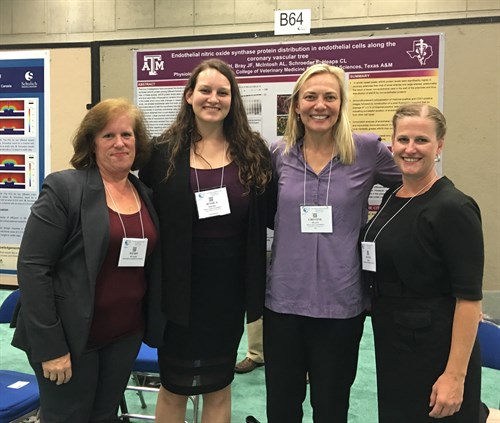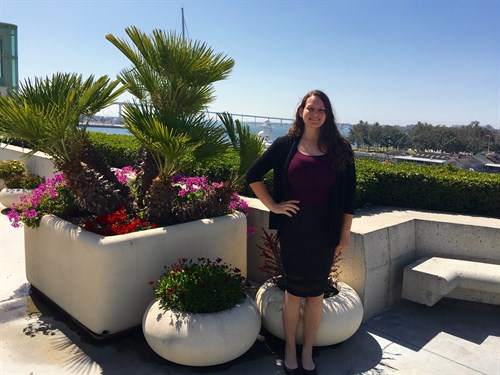Jessica Israel–A Pioneer in Veterinary Medicine and the Deaf Community
Jessica Israel, a graduate student pursuing a non-thesis master’s in biomedical sciences at the Texas A&M College of Veterinary Medicine & Biomedical Sciences (CVM), is trekking her own path to a veterinary medicine degree by first immersing herself in research, an unconventional path for most non-thesis graduate students. Through her research experience, she hopes to contribute a different perspective to veterinary medicine. As a member of the deaf community, she will add to the diversity of the veterinary community.

Although some may consider her deafness a challenge, Israel has not let it get in the way of her research. In April 2016, Israel was selected to present her research at the Experimental Biology Conference in San Diego—a conference that presents novel research discoveries in the fields of anatomy, biochemistry and molecular biology, investigative pathology, nutrition, pharmacology, and physiology. Israel’s selection to present at the conference was in recognition for her research and her position as a non-thesis major involved in research.
At the conference, Israel worked alongside interpreters to present her work to fellow scientists. “I had the chance to present my poster to scientists, who listened with interest and wanted to compare and discuss data from their research,” she said. “Scientists with years of experience in their field gave me feedback on how I could improve my experiments. I found this experience stimulating, and it boosted my confidence. The chance to interact with others, network, and listen to what others had to say was an amazing experience.”
There was much preparation for the poster presentation, Israel explained, “the conference provided me with two interpreters who would act as my voice during the duration of the presentation, and I was hesitant to put my trust in those interpreters because I didn’t know if they had a scientific background until I met them. So, I prepared a script with exact wording I would say during the presentation and tried to help them understand what the research project was about prior to giving the presentation. In the morning, I spent four hours practicing my presentation with them, and it took a while for them to learn. In the end, the presentation turned out great.”
The conference also introduced Israel to several scientists who were interested in collaborating with her. This was an opportunity Israel was grateful for. “I would encourage everyone to have a similar experience because it helps develop better interpersonal skills and increase networking,” she said. “I met several people who I would like to stay in touch with and could help me grow professionally.”
Israel’s interests in biomedical sciences and veterinary medicine include small animal surgery and research that could help build an even stronger bridge between human and animal health. Under the direction of Dr. Cristine L. Heaps, an assistant professor in the Department of Veterinary Physiology & Pharmacology at the CVM, Israel conducts research on the circulatory system, something she may continue to focus on after acquiring her master’s degree.
“I haven’t decided specifically which area of focus I want to study in veterinary school, but knowledge of the circulatory system would be beneficial,” Israel said. “I do know I want to focus on the surgical aspect of veterinary medicine and do more extensive surgery.”
Using pigs as models, Israel’s research focuses on endothelial nitric oxide synthase—or eNOS—distribution along the blood vessels that supply the heart and how this can affect blood pressure regulation. These eNOS receptors—which are released by the heart in reaction to stress—aid in the dilation of blood vessels and help regulate blood pressure. The potential to help better understand the role of blood pressure regulation in heart disease attracted Israel to study the cardiovascular system.
“I used to work in a different lab last year under Dr. Thomas Ficht, whose research focus is on brucellosis—an infection spread from animals to people through unpasteurized dairy products,” Israel said. “After working for him for a year, my interest of working in a different lab was piqued by my advisor, Dr. Heaps, who enthusiastically discussed her lab with me. I became curious and thought working in her lab would be fun, especially after being asked the question, ‘Have you ever seen a pig run on a treadmill?’ It was something I have never envisioned, and I was hooked. I asked her if I could work in her lab this year, and she agreed. I managed to see several pigs running on a treadmill; it was a funny and awesome sight.”

Before Israel was inspired to pursue her education at the CVM, she earned her undergraduate degree in biology and a minor in chemistry at Gallaudet University in Washington D.C., a university for the deaf. Growing up in a deaf community, she attended a deaf school from elementary through high school. The shift to a university full of hearing people for her master’s degree was a challenge. However, Israel quickly adapted to the change.
“It was a huge change for me, using interpreters and other modes of communication besides sign language,” Israel said. “In itself, it was and still is a challenge and great experience.”
Her transition from being immersed within a deaf community to attending Texas A&M University helped prepare Israel for the beginning of her journey toward applying for veterinary school at Texas A&M. Since then, Israel has made Texas A&M her home and is not afraid to push past her obstacles. Her mentors have helped Israel explore her interests and fulfill her goals as a future veterinary student. Israel said she feels the opportunities at Texas A&M are limitless.
“Texas A&M has accommodated my needs and the professors here do a lot to give me the best access to information,” she said. “Several professors were willing to learn sign language in order to communicate with me better. They went beyond my expectations and I am grateful for this.”
Israel’s independent and confident attitude has helped her succeed at the CVM. Her devotion to her research has opened many doors to future collaborations with other scientists, as well as future opportunities to strengthen the connection between human and animal health. Israel is admired by other students and CVM staff and faculty alike.
“I am thoroughly impressed with Jessica’s tenacity as she navigates her way through the curriculum for the non-thesis master’s degree,” Heaps said. “She has performed superbly despite the obstacles to learning that she has had to overcome. In addition to her persistence in the classroom, Jessica has gone beyond that required in the non-thesis master’s program and has spent considerable time in the laboratory and preparing her scientific poster for presentation in San Diego. Jess maintains an incredibly positive attitude while negotiating every hurdle. She is a role model for all students, regardless of whether they are members of the deaf or hearing communities.”
“I am here to educate about deaf culture and show that anyone can do anything,” Israel said. “Members of the deaf community can do as much as anyone else, and I am an example of that.”


